SUPPORTING THE LIFE OF THE LAND
Expanding the availability of premium biochar for Maui landowners and land managers, made on Maui with local invasive hardwoods.
OUR HEARTS ARE WITH YOU, MAUI.
We have paused our Fresh Batch Product Pickup program in the wake of the Maui Fires. Our team is assisting with recovery and is unable to serve you with direct sales at this time but you can find our products in select stores & place wholesale order with us. Please consider a donation.
Retail
You can find our biochar products here.
Wholesale
Place a custom wholesale order here.
Donate
Please donate generously to Maui Rapid Response , Kula Community Watershed Alliance, or Hawaiʻi Community Foundationʻs Maui Strong Fund.
Remediating Maui Soils with Biochar
For several years, our team has been studying with and learning from researchers about the ways biochar can serve as a filter for toxins in the landscape. Recently, we’ve provided large quantities of locally-made biochar to Maui customers. They have used our product as fertilizer to reduce harmful runoff and in retention ponds during commercial construction to protect the reefs and ocean life.
In the wake of the Maui wildfires, we are making engineered batches of biochar that are designed to reduce the bioavailability and leachability of heavy metals and organic pollutants in soils through absorption while simultaneously encouraging the proliferation of beneficial microbes that break down organic pollutants (bioremediation).
Through our partnership with The Nature Conservancy, we are able to offer biochar for house site remediation free of charge.

Biochar made from Eucalyptus
Seen under an electron microscope
What is Biochar?
-
Technically, biochar is the lightweight residue left over after the pyrolysis (thermochemical conversion) of biomass into carbon. Haleakalā Biochar products are made on Maui – our feedstock comes from local invasive hardwood tree removal projects and other sources of clean haredwood biomass that would otherwise decompose, become a fire hazard, be burned to ash, or end up in the landfill.
-
Biomass burning and natural decomposition releases large amounts of carbon dioxide and methane to the Earth's atmosphere. Biochar carbon remains in the ground for centuries, slowing the growth in atmospheric greenhouse gas levels. According to Project Drawdown, biochar can reduce carbon dioxide emissions 1.36–3.00 gigatons by 2050. One ton of biochar sequesters 3 tons of carbon dioxide, according to Chemists Without Borders, a nonprofit group of scientists combating climate change.
-
Biochar offers multiple soil health benefits in degraded tropical soils like those in Hawaiʻi. Its porous nature is effective at retaining both water and water-soluble nutrients. Soil biologist Elaine Ingham highlighted its suitability as a habitat for beneficial soil micro organisms, which is a particular benefit for degraded soils. She pointed out that when pre-charged with these beneficial organisms, biochar promotes good soil and plant health. With hardwood-sourced biochar made to the right specifications, we can also improve water and soil quality (including soil remediation), increase soil fertility, and raise agricultural productivity.
-
Our team has been working to restore landscapes back to native habitats on Maui for over 15 years, and in the process, we have removed a lot of invasive Eucalyptus, Wattle, and other types of invasive trees that contribute greatly to wildfire hazards and native habitat loss on Maui. While we don’t want these problematic trees growing on Maui, we can transform these “enemies” in to assets through biochar production. A win-win for Maui!
WHY BIOCHAR WORKS
A MAGICAL STORY
Biochar is made up of pukas (holes)
Imagine biochar as a hale (house)
Good microbes live in those pukas
This is where the magic happens
Why is Biochar Helpful in Hawai'i?
Our Soils
Here in the tropics, soils can grow increasingly more degraded over time–especially with the rate of deforestation and ecosystem disruption we have experienced. The soil amendments developed by Haleakalā Biochar are carefully designed to establish the best possible soil conditions, laying the groundwork that allows a micro-ecosystem of beneficial microbiology to thrive in your farm, garden, and landscape. Applied correctly, Haleakalā Biochar’s products will establish a healthy system that takes care itself, encouraging the natural growth of nutrients in your topsoil over the long-term. We know the costs of managing land in Hawai’i are very high–so we want you to know that there are even programs through the USDA/NRCS to assist agricultural producers with the cost of applying biochar.
Our Waters
As a remote island community, our fresh water resources are LIFE. Everything we do on Maui is impactful to our water resources, and we have a choice of the kind of impact we‘d like to make. What happens on the land ultimately ends up in our ground water, our streams, our fishponds, reefs, and near-shore ocean ecosystems. Our biochar, designed for optimum toxin filtration, is currently being used in stormwater retention ponds that protect our most pristine reefs.
About Us
Aloha, we are makers of premium, made-to-order biochar to support the life of the land and the health of our soils, fresh water, and ocean. Located high on the slopes of Haleakalā, since 2020 our family-run business has committed to making the highest quality biochar and value added products to promote a circular economy on Maui. We provide Maui-made biochar for agricultural producers, home gardeners, land restoration projects, and stormwater filtration projects, and in the aftermath of the Maui wildfires, soil remediation.
Long-time Upcountry residents, our professional background is in native habitat restoration, soil rehabilitation, and sustainable business strategy.
We’ve learned over the years that restoration starts from the ground up. So, building healthy soil is the first step.
A FEW OF OUR NOTABLE CUSTOMERS AND CLIENTS:















